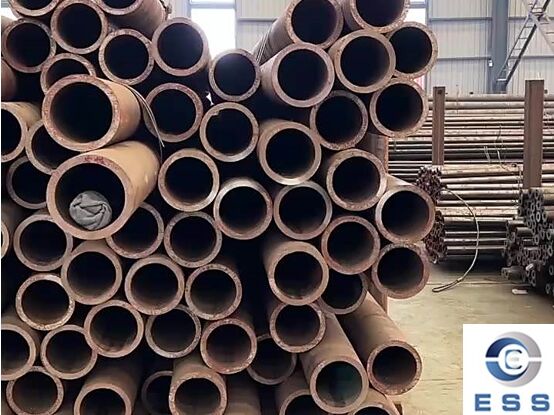
Mild
steel pipe is the main pipe material for construction, pipeline
transportation, machinery manufacturing, automobiles, oil and gas industries
due to their low carbon content (generally ≤0.25%) and
excellent plasticity, toughness and weldability. According to different
standards and process requirements, mild steel pipes can be subdivided into a
variety of material models. The following will give you a detailed answer.
The oil and gas pipeline standard API 5L,
etc., clearly stipulates the grades of carbon
steel pipe. Common mild steel pipe material models include:
Q195, Q215, Q235, Q255, Q275 (GB series)
API 5L Gr.B, X42, X46, etc. (pipeline
steel)
Mild steel pipe material models
|
Material grade
|
Main standard
|
C content (%)
|
Tensile strength Rₘ (MPa)
|
Yield strength Rₚ₀.₂ (MPa)
|
Typical application scenarios
|
|
ASTM A53 Gr A
|
ASTM A53/A106
|
≤ 0.25
|
205 – 330
|
≥ 170
|
Low-pressure water supply, HVAC pipes
|
|
ASTM A53 Gr B
|
ASTM A53/A106
|
≤ 0.30
|
330 – 460
|
≥ 240
|
Steam transportation, general structural
pipes
|
|
ASTM A106 Gr B
|
ASTM A106
|
≤ 0.30
|
≥ 415
|
≥ 240
|
Oil and gas high temperature and high
pressure fluid pipelines
|
|
ASTM A500 Gr B/C
|
ASTM A500
|
≤ 0.30
|
350 – 480
|
215 / 290
|
Square tubes and rectangular
tubes for structures
|
|
EN 10219 S235JR
|
EN 10219
|
≤ 0.17
|
360 – 510
|
≥ 235
|
Building structures, bridge supports
|
|
EN 10219 S275JR
|
EN 10219
|
≤ 0.21
|
410 – 560
|
≥ 275
|
Medium and low strength structural tubes,
factory steel structures
|
|
EN 10219 S355JR
|
EN 10219
|
≤ 0.22
|
470 – 630
|
≥ 355
|
Heavy load structures, container frames,
shipbuilding pipes
|
|
API 5L Gr B
|
API 5L
|
≤ 0.24
|
≥ 415
|
≥ 240
|
Oil and gas pipelines
|
|
API 5L X42/X52
|
API 5L
|
≤ 0.24
|
≥ 455 / 515
|
≥ 290 / 355
|
High-pressure offshore/onshore oil and
gas pipelines
|
|
Q195
|
GB 3091, GB 8162/8163
|
≤ 0.12
|
285 – 415
|
≥ 195
|
Light industrial products and parts
|
|
Q215
|
GB 3091, GB 8162/8163
|
≤ 0.15
|
315 – 465
|
≥ 215
|
Manufacturing of light structures and
mechanical parts
|
|
Q235
|
GB 3091, GB 8162/8163
|
≤ 0.22
|
375 – 500
|
≥ 235
|
General structures, bridges, general oil
and gas pipelines
|
|
Q255
|
GB 3091, GB 8162/8163
|
≤ 0.25
|
390 – 520
|
≥ 255
|
Light-load structural parts, mechanical
parts
|
|
Q275
|
GB 3091, GB 8162/8163
|
≤ 0.28
|
420 – 550
|
≥ 275
|
Medium and low pressure water supply,
shipbuilding, container frame, machinery manufacturing, welding, cold forming
and other fields
|
Note: Tensile strength and yield strength
are typical value ranges. The actual indicators should be based on the latest
standards or material certificates (MTC) provided by the manufacturer.
Mild steel pipe models selection guide
1. Working medium and temperature
Normal temperature and low pressure fluid:
ASTM A53 Gr A, EN S235JR, Q195 mild steel pipe
Steam or medium temperature and high
pressure: ASTM A53 Gr B / A106 Gr B / Q215 / Q235 mild steel pipe
High temperature and high pressure oil and
gas: ASTM A106 Gr B-C / API 5L X grade / Q275 mild steel pipe
2. Structural load and mechanical
properties
General structure and support: EN S235JR /
ASTM A500 Gr B / Q215 mild steel pipe
Medium and high strength structure: EN
S275JR / ASTM A500 Gr C / Q235–Q255 mild steel pipe
Heavy load or vibration conditions: EN
S355JR / API 5L X42 and above / Q275 mild steel pipe
3. Welding and processing
Low carbon content, good plasticity: easier
to weld and cold bend.
High strength models (X52 and above):
preheating and post-heating need to be controlled to prevent cracks.
4. Corrosion and protection
Outdoor or humid environment: hot-dip
galvanizing (ASTM A123), internal and external anti-corrosion coating.
Acidic or sulfur-containing working
conditions: optional HIC/SCC hydrogen-induced cracking resistance grade or
low-alloy corrosion-resistant pipe.
Summary
It should be noted that the model and
performance of ms pipes vary according to different standards and uses.
Therefore, in actual applications, it is necessary to select the appropriate
model according to specific needs and uses, and also consider the matching
degree of related accessories, such as pipe flange and valve. At the
same time, the quality and performance of mild steel pipes are also affected by
the production process and raw materials. Therefore, when purchasing and using,
it is necessary to pay attention to the inspection and evaluation of product
quality and performance, and also pay attention to the quality evaluation of
accessories, and try to choose high-quality supplier.
Read more: Difference between mild steel pipe and carbon steel pipe or How long can mild steel pipes last?













 Eastern Steel Manufacturing Co.,Ltd not only improve product production and sales services, but also provide additional value-added services. As long as you need, we can complete your specific needs together.
Eastern Steel Manufacturing Co.,Ltd not only improve product production and sales services, but also provide additional value-added services. As long as you need, we can complete your specific needs together.










